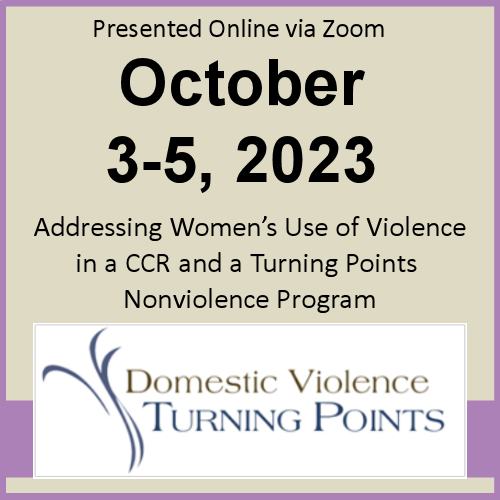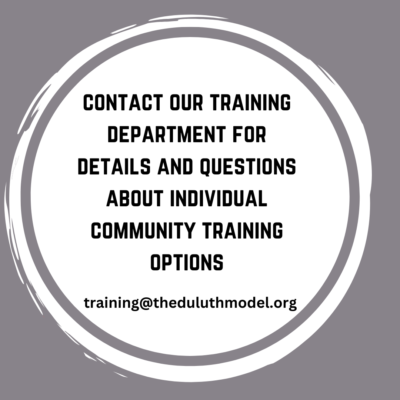Description
Addressing Women’s Use of Violence in a Women’s Nonviolence Program and a Coordinated Community Response (CCR)
There are two variations/options for the training.
Full 3 Days — October 3-5 – The first two days will address women’s use of violence in a women’s nonviolence program and the third day will cover the CCR response.
1 Day CCR Only – October 5th – training related to the CCR response to women’s use of violence.
Since the implementation of mandatory arrest policies there has been an increase in the arrest of women in cases of domestic violence. Are the women who are being arrested and/or court ordered to nonviolence programs battering their partners, using resistive violence, or neither? Does the local Coordinated Community Response (CCR) have a differentiated response or are all cases of domestic violence treated the same? What are effective interventions that address the violence women experience and the violence they use? This 3 day training explores the answer to these questions.
Interventions to end domestic violence that are successful always account for: 1) the abuser; 2) the victim of the abuse; 3) those who are in relationships with the abuser and/or victim (children, family members, friends); and 4) the outside intervener. When the facts are clear the role of the intervener is clear. However, getting those facts and putting them into context isn’t always easy. This training will examine the Duluth Model’s response to a Coordinated Community Response (CCR) to women’s use of violence. To be effective, interventions for women who use violence must address the contextual factors of women’s lives.
Turning Points: A Nonviolence Curriculum for Women is a group curriculum for women who have used violence in their intimate partner relationships. The Turning Points curriculum focuses on helping women understand the connections between the violence they experience and the violence they use. This training will cover the underlying assumptions of Turning Points and the three parts of the curriculum.
Addressing Women’s Use of Violence is a training for nonviolence group facilitators, probation officers, therapists, advocates, and other interveners that work with women who use violence against their intimate partners in a CCR and group process.
The Turning Points curriculum and the Duluth Model Coordinated Community Response (CCR) training curriculum are not included with registration and must be purchased separately. They can be purchased at:
Domestic Violence Turning Points curriculum: www.dvturningpoints.com
Duluth Model CCR training curriculum: www.theduluthmodel.org
REGISTER
Online registration: Add this item to your cart.
Phone registration: Call us toll-free at 1-866-417-6111, option 1.
Fax or mail registration: registration and order form
Fax number: 218-722-0779
TRAINING INFORMATION
Cancellation policy
Refunds (minus a $75 service charge) will be granted for cancellations at least two weeks before the event.
QUESTIONS?
Contact us at 1-866-417-6111, option 1 or training@theduluthmodel.org.
Dates:
October 3, 2023 – 9am-4pm: Turning Points Curriculum presented by Melissa Scaia
October 4, 2023 – 9am-4pm: Turning Points Curriculum presented by Melissa Scaia
October 5, 2023 – 9am-4pm: CCR, Blueprint for Safety, Crossroads Program presented by Melissa Scaia and Scott Miller
Trainers
Melissa Scaia, Turning Points co-author — Days 1 through 3
Scott Miller, Duluth Model CCR trainer — Day 3
NOTE
This training is organized and provided by Turning Points, DAIP does not own or provide this training. DAIP is processing the registrations and providing a co-trainer for day 3 only. DAIP will receive a portion of the registration fees from Turning Points as compensation.
BIOGRAPHY OF TRAINERS
Melissa Petrangelo Scaia, M.P.A.
Melissa Petrangelo Scaia is the Director of International Training for Global Rights for Women (GRW). At GRW, Melissa also co-facilitates a men’s domestic violence nonviolence group each week in Pathways to Family Peace. She has been co-facilitating in men’s and women’s nonviolence programs for over 23 years. In her position at GRW she brings a wealth of experience as the former executive director of Domestic Abuse Intervention Programs (DAIP), also known as “the Duluth Model.” Prior to working in Duluth she was the executive director of Advocates for Family Peace (AFFP) for 17 years, a local domestic violence advocacy program where she advocated for victims of domestic violence. She has also lead and organized two Coordinated Community Responses (CCR) to address domestic violence in Minnesota. She has been a consulting trainer for a number of national training organizations on domestic violence and child abuse, including the Center for Justice Innovation (CJI), the Battered Women’s Justice Project (BWJP) and the National Council of Juvenile and Family Court Judges (NCJFCJ). As a qualified expert in the state of Minnesota she testifies as an expert witness on domestic violence in criminal court cases. She wrote her masters thesis on the effects of domestic violence on children and wrote her doctoral dissertation proposal to address supervised visitation, children and domestic violence. She has contributed to numerous publications related to domestic violence nonviolence programing, supervised visitation, women’s use of violence and domestic violence. She co-wrote a curriculum and DVD for working with men who batter as fathers entitled, Addressing Fatherhood with Men Who Batter. She also co-authored a curriculum and DVD with Ellen Pence, PhD and Laura Connelly for working with women who have used violence in intimate relationships entitled, Turning Points: A Nonviolence Curriculum for Women. Most recently, she authored Safe Consultations with Survivors of Violence Against Women and Girls, a guide with UN Women on how to conduct focus groups and interviews with survivors. She has been selected for numerous roundtable advisory discussion groups for the Office on Violence Against Women through the National Judicial Institute on Domestic Violence. She was named to a National Consulting Group on Batterers Intervention Programs and as a National Advisory Committee Member for Law & Order: SVU actress Mariska Hargitay’s Joyful Heart Foundation for survivor-based healing. She has also conducted research on topics related to domestic violence: 1) women’s use of violence and 2) using videoconference software to conduct men’s batter intervention programming (BIP). Recently at GRW, she has participated in a number of United Nations Expert Meetings related to domestic violence and worked with numerous UN Women regional offices and local women’s organizations globally. This past year she was awarded the Lifetime Achievement Award for Women in Public Service from Hamline University. Outside of her work she is a mother of two, a Minnesota State High School League volleyball referee, and has a passion for photography.
Scott Miller
Scott Miller is the Executive Director for the Domestic Abuse Intervention Programs and has worked for the DAIP since 2000. Scott coordinates Duluth’s coordinated community response to domestic violence by managing the system change efforts and men’s nonviolence program. Scott trains nationally and internationally on the Duluth Model method of organizing. He also partners with communities around the world who are naming, organizing and creating innovative responses to domestic violence using the Duluth Model. Scott has also co-authored the latest edition of DAIP men’s nonviolence curriculum Creating a Process of Change for Men Who Batter.
Scott works independently as an expert witness in criminal and civil trials to explain how the tactics of abusers and the associated risks generated by battering are linked to the counterintuitive behaviors of victims. Scott has testified more than 40 times in state district courts, federal court and federal military court.
In 2021, Scott was hired by the Minnesota Child Welfare Training Academy through the University of Minnesota School of Social Work in partnership with the Minnesota Department of Human Services. Scott will provide domestic violence training to social workers across the state of Minnesota.
From 2001 to 2015, Scott was a contract trainer and forensic interviewer for First Witness Child Abuse Resource Center in Duluth, MN. Scott was responsible for conducting forensically sound interviews of children suspected of being physically or sexually abused as part of a criminal investigation. Scott also trained nationally on how to conduct interviews with children and work from a multidisciplinary team approach in the investigation of child abuse.
Scott Miller has been working in the women’s movement since 1985.


